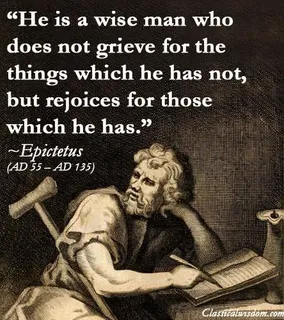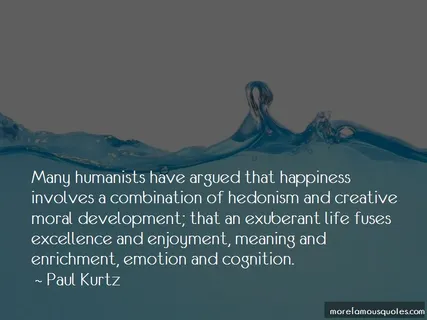Dear Hiveans,

have you ever heard of the philosophical concepts of "Stoicism" or "Hedonism"?
Here a short overview of these concepts:
Stoicism
- a philosophy of personal ethics and a methodology for seeking practical wisdom in life.
- contains the belief that we don’t react to events; we react to our judgments about them, and the judgments are up to us.
- we shouldn't worry about things beyond our control because everything in life can be divided into two categories – things we can control and things we cannot.
- this philosophy is designed to make us more resilient, happier, more virtuous and more wise.
- Philosophers/proponents of Stoicism are Epictetus, Democritus, Seneca, Ryan Holiday.
- More info: 1. stoicism_encyclopedia, 2. what_is_stoicism, 3. short_video_on_stoicism
Hedonism
- idea that the end goal of all of our actions is pleasure and to avoid pain
- dismissal of delayed gratification; find pleasure in the present, in what is available right now
- Proponents: Aristippus of Cyrene, Jeremy Bentham, John Stuart Mill, young people, drug addicts
- more info: 1. hedonism_encyclopedia, 2. video_on_hedonism
My view
On a first glance these 2 philosophies seem to be contradictory in the sense that you can only adhere to one of them. But I find both of them interesting and try to learn from them. Yes, there is much uncertainty about the future. But does that mean that I have to squander my resources and throw myself into a life of short-term pleasures like alcohol or drugs (not that I hadn't my phases of excessiveness 😌)? I don't think so. I think one can find happiness
- in working on and improving oneself
- using one's strengths and capabilities to add value to and improve on society
- focusing on important things, meaning fewer alerts and notifications, less news, questioning that "open door" policy for too many people, avoiding toxic people.
- trying to enjoy stressful moments as these are important experiences (and every such moment could be our last) and as the feeling of stress is a signal that this situation is important to us
- studying the world philosophically, with a long-term perspective
--> And with doing all that, one still can be present, experience this moment right now as a gift ("that's why we call it the present" source) without sacrificing one's future.
Enjoy your day,
zuerich
Recommended reading:
- Victor Frankl: Man's search for meaning, or pdf here
- Marcus Aurelius: Meditations
- Ryan Holiday: books or videos (I prefer his books)
Liebe Hiver,
kennt Ihr die philosophischen Konzepte des "Stoizismus" oder des "Hedonismus"?
Hier ein kurzer Überblick:
Stoizismus
- eine Philosophie der persönlichen Ethik und eine Methodik für die Suche nach praktischer Weisheit im Leben.
- beinhaltet die Überzeugung, dass wir nicht auf Ereignisse reagieren, sondern auf unsere Urteile über diese Ereignisse, und diese Urteile obliegen uns (=Entscheidungsfreiheit).
- Wir sollten uns keine Sorgen über Dinge machen, die sich unserer Kontrolle entziehen, denn alles im Leben lässt sich in zwei Kategorien einteilen: Dinge, die wir kontrollieren können, und Dinge, die wir nicht kontrollieren können.
- Diese Philosophie zielt darauf ab, uns widerstandsfähiger, glücklicher, tugendhafter und weiser zu machen.
- Philosophen/Vertreter des Stoizismus sind u.a. Epiktet, Demokrit, Seneca und Ryan Holiday.
- Mehr Informationen: 1. stoicism_encyclopedia, 2. what_is_stoicism, 3. short_video_on_stoicism
Hedonismus
- Vorstellung, dass das Endziel all unserer Handlungen das Vergnügen und die Vermeidung von Schmerz ist
- Ablehnung einer Aufschiebung von Befriedigung; man sucht das Vergnügen in der Gegenwart, in dem, was gerade verfügbar ist
- Befürworter: Aristippus von Kyrene, Jeremy Bentham, John Stuart Mill, junge Menschen, Drogensüchtige
- Mehr Informationen: 1. hedonism_encyclopedia, 2. video_on_hedonism
Meine Ansicht
Auf den ersten Blick scheinen diese 2 Philosophien widersprüchlich zu sein, in dem Sinne, dass man sich nur einer von ihnen anschließen kann. Aber ich finde beide interessant und versuche, von ihnen zu lernen. Ja, es gibt viel Ungewissheit über die Zukunft. Aber heißt das, dass ich meine Ressourcen vergeuden und mich in ein Leben mit kurzfristigen Vergnügungen wie Alkohol oder Drogen stürzen muss (nicht, dass ich nicht auch meine Phasen der Maßlosigkeit hatte 😌)? Nein, das glaube ich nicht. Ich denke, man kann Zufriedenheit, Spass und Glück darin finden,
- wenn man an sich arbeitet und sich verbessert
- seine Stärken und Fähigkeiten zu nutzen, um der Gesellschaft einen Mehrwert zu bieten und die Gesellschaft zu verbessern
- sich auf die wichtigen Dinge zu konzentrieren, d.h. weniger Alarme und Benachrichtigungen, weniger Nachrichten, die Politik der "offenen Tür" für zu viele Menschen in Frage zu stellen, toxische Menschen zu meiden.
- zu versuchen, stressige Momente zu genießen, da dies wichtige Erfahrungen sind (und jeder solche Moment unser letzter sein könnte) und da das Gefühl von Stress ein Signal ist, dass diese Situation für uns wichtig ist
- die Welt philosophisch zu studieren, mit einer langfristigen Perspektive
--> Und bei all dem kann man sehr gut im Jetzt leben, diesen Moment als Geschenk erleben (das Wort "present" im Englischen bedeutet ja nicht umsonst sowohl Gegenwart als auch Geschenk), ohne seine Zukunft zu opfern.
Geniesst den Tag,
zuerich
Empfohlene Lektüre:
- Victor Frankl: Trotzdem ja zum Leben sagen , Link_zum_pdf
- Marcus Aurelius: Meditationen
- Ryan Holiday: Bücher oder Videos (ich bevorzuge seine Bücher)
Queridos Hiveanos,
¿han oído hablar alguna vez de los conceptos filosóficos de "estoicismo" o "hedonismo"?
Aquí un breve resumen de estos conceptos:
Estoicismo
- una filosofía de ética personal y una metodología para buscar la sabiduría práctica en la vida.
- contiene la creencia de que no reaccionamos a los acontecimientos; reaccionamos a nuestros juicios sobre ellos, y los juicios dependen de nosotros.
- no debemos preocuparnos por las cosas que están fuera de nuestro control porque todo en la vida puede dividirse en dos categorías: las cosas que podemos controlar y las que no.
- esta filosofía está diseñada para hacernos más resistentes, más felices, más virtuosos y más sabios.
- Los filósofos/proponentes del estoicismo son Epicteto, Demócrito, Séneca y Ryan Holiday.
- Más información: 1. 1. stoicism_encyclopedia, 2. what_is_stoicism, 3. short_video_on_stoicism
Hedonismo
- idea de que el objetivo final de todas nuestras acciones es el placer y evitar el dolor
- descarta la gratificación retardada; encuentra el placer en el presente, en lo que está disponible ahora mismo
- Proponentes: Aristipo de Cirene, Jeremy Bentham, John Stuart Mill, jóvenes, drogadictos
- más información: 1. 1. hedonismo_enciclopedia, 2. video_sobre_hedonismo
Mi opinión
A primera vista estas 2 filosofías parecen ser contradictorias en el sentido de que sólo se puede adherir a una de ellas. Pero yo encuentro ambas interesantes y trato de aprender de ellas. Sí, hay mucha incertidumbre sobre el futuro. Pero, ¿significa eso que tengo que dilapidar mis recursos y lanzarme a una vida de placeres a corto plazo como el alcohol o las drogas (no es que no haya tenido mis fases de excesos 😌)? Yo creo que no. Creo que uno puede encontrar la felicidad
- en trabajar y mejorar uno mismo
- utilizando las fortalezas y capacidades de uno para añadir valor y mejorar la sociedad
- centrarse en las cosas importantes, es decir, menos alertas y notificaciones, menos noticias, cuestionar esa política de "puertas abiertas" a demasiada gente, evitar a la gente tóxica.
- intentar disfrutar de los momentos de estrés, ya que son experiencias importantes (y cada uno de esos momentos podría ser el último) y porque la sensación de estrés es una señal de que esa situación es importante para nosotros
- estudiar el mundo filosóficamente, con una perspectiva a largo plazo
--> Y con todo esto, puedes vivir muy bien el ahora, experimentar este momento como un regalo (la palabra "presente" en inglés no significa tanto presente como regalo para nada), sin sacrificar tu futuro.
¡Disfruta de tu día!
Lectura recomendada:
- Victor Frankl: El hombre en busca de sentido, o pdf en espanol aquí
- Marco Aurelio: Meditaciones
- Ryan Holiday: libros o vídeos (prefiero sus libros)

